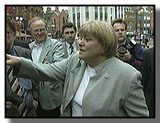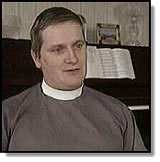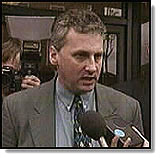
|
Mowlam Confronts Ulster's Marching CrisisThe Northern Ireland Secretary Mo Mowlam has been criticised by unionists over her talks with nationalist residents groups opposed to disputed loyalist parades in Northern Ireland this summer.But Ms Mowlam pledged to keep the dialogue going, insisting that talking was "the only way forward." In a whirlwind round of meetings, she toured the major hot spots on the parade's map. These included the village of Dunloy, which saw violent clashes between police and loyalists when an Apprentice Boys' parade was blocked on Sunday, the Garvaghy Road in Portadown and Belfast's Lower Ormeau Road. Last night the Secretary of State met Orange Order leaders in County Armagh to discuss the Drumcree Parade in Portadown, which has sparked serious trouble for the past two years and is now just six weeks away.
Her actions would be a massive boost to Sinn Fein's vote and were "unforgivable", he said. Firmly denying the accusations, Ms Mowlam said: "It's a question of timetabling rather than bad politics in my point of view. We are running out of time and I think anything we can do is what is important." Ms Mowlam's willingness to meet the residents groups appeared to have raised nationalists' hopes. "I have no doubt that Mo Mowlam won't step away from political decisions," said Gerard Rice, of the Lower Ormeau Concerned group. "She will make decisions, she's not going to leave it in the hands of the RUC."
Describing the meetings as informative and constructive, Ms Mowlam said: "I want to listen to all sides so I know what the situation is. As I have said all along, what matters most is local negotiation. The groups I have listened to this morning definitely want to avoid a repeat of last summer and believe they should talk." She said she would continue to meet with the residents' groups and urged all sides, either directly or indirectly through intermediaries, to talk. "The people of Northern Ireland do not want a repeat of Drumcree," Ms Mowlam said. She will be reinforcing that message when she visits the United States tomorrow."
|
Diana, Princess of Wales, 1961-1997
Conference 97
Devolution
The Archive
News |
Issues |
Background |
Parties |
Analysis |
TV/Radio/Web
Interactive |
Forum |
Live |
About This Site
News |
Issues |
Background |
Parties |
Analysis |
TV/Radio/Web
Interactive |
Forum |
Live |
About This Site
© BBC 1997 |
politics97@bbc.co.uk |


